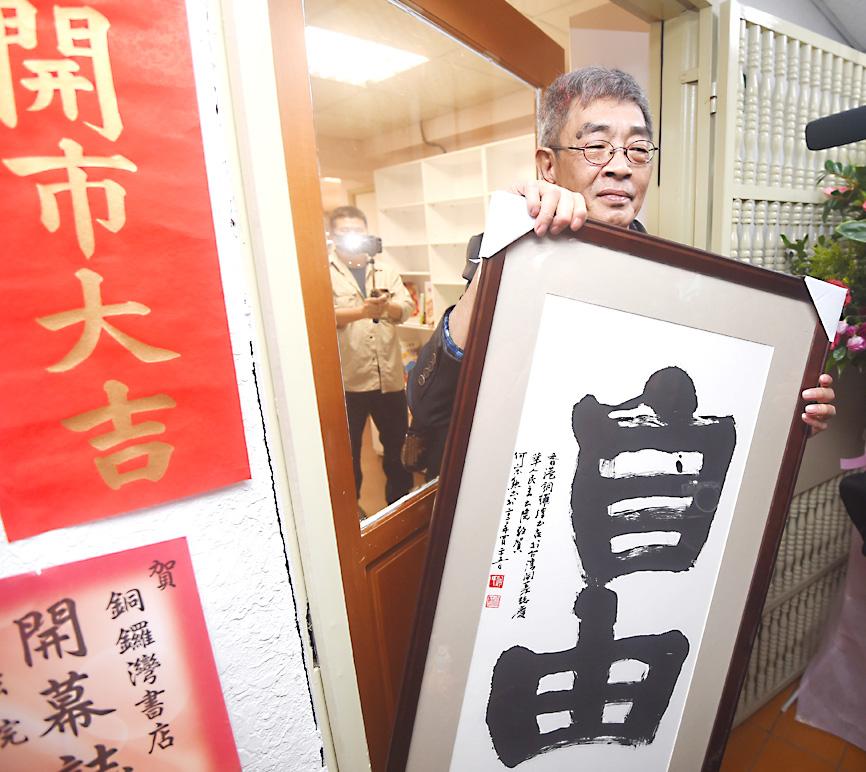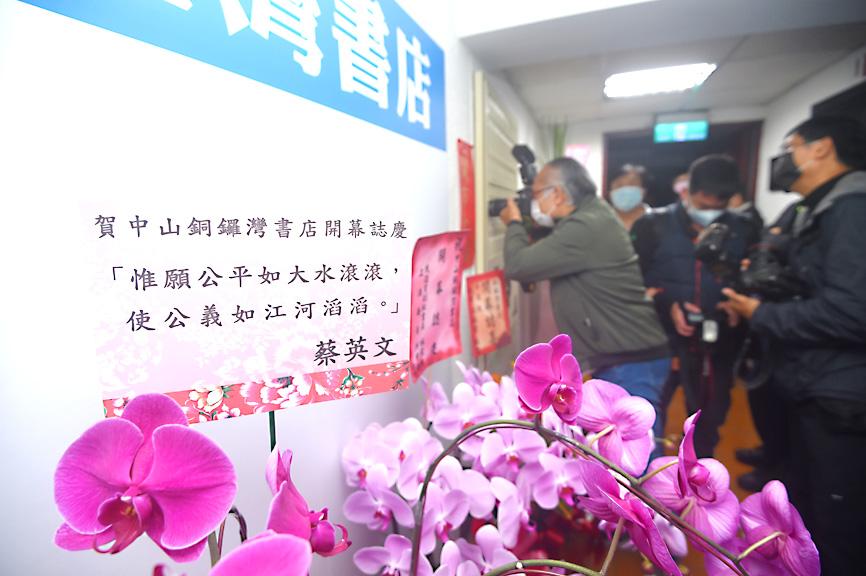Taiwan is the “last fortress” for Hong Kong residents in the face of Chinese oppression, Causeway Bay Books (銅鑼灣書店) manager Lam Wing-kei (林榮基) said yesterday, calling on fellow Hong Kongers to escape from the territory and join the resistance “from the outside.”
Lam made the remarks at the launch of his bookstore in Taipei when asked by reporters whether he sees in Hong Kong the same hope that he said he saw in Taiwan.
Lam — who was manager of Hong Kong’s Causeway Bay Books, which was founded in 1994 and sold work critical of Chinese leaders — fled to Taiwan in April last year amid fears of persecution by Beijing.

Photo: Fang Pin-chao, Taipei Times
The Taipei bookstore opened yesterday after raising nearly NT$6 million (US$199,468) through a crowdfunding Web site from September to November last year.
It is difficult to compare Hong Kong to Taiwan, as unlike Taiwanese, Hong Kongers are not protected by a military, Lam said.
“In a place that has fallen victim to oppression and where personal safety is a concern, young Hong Kongers should seriously consider leaving that dangerous place and rebel from the outside,” he said.

Photo: Fang Pin-chao, Taipei Times
“For example, I opened a bookstore [outside of Hong Kong] as a way of rebelling,” he added.
“A rebellion does not stop after three, five or 10 years,” Lam said. “We should plan for the long haul.”
Asked whether he thought it was lenient to allow bail for three people suspected of splashing red paint on him, Lam said that Taiwan is still the last refuge for Hong Kongers.
“If Hong Kongers encountered the same oppression as I have, at least they would still have a place to go — Taiwan,” he said, thanking the government for all that it has done to shelter him and his friends who would otherwise not be safe in Hong Kong.
Asked if he supported the New Power Party’s call to amend Article 18 of the Act Governing Relations with Hong Kong and Macau (香港澳門關係條例) to officially give Hong Kongers the ability to seek political asylum in Taiwan, Legislative Speaker You Si-kun (游錫堃), who attended the store’s opening, said that he supports any legislation that would make Taiwan a fairer and more just, liberal and democratic nation that could further advance human rights.
Secluded on the 10th floor of an unassuming office building on Nanjing W Road in Taipei’s Zhongshan District (中山), the new iteration of Causeway Bay Books features cozy colors, a clean layout and a brightly lit reading area that belies the underwhelming facade of the building housing it.
Hsu Shih-hsun (徐仕勛) and Wang Tsung-fan (王宗凡), 16, said that they traveled from Taoyuan to visit the bookstore, where they hoped to purchase books that are banned in Hong Kong.
Hsu said that he was moved to see Lam have the courage to reopen the bookstore after being persecuted by the Chinese government and terrorized by alleged gangsters, adding that Lam’s decision to settle in Taiwan made him feel proud to be Taiwanese.

ACTION PLAN: Taiwan would expand procurement from the US and encourage more companies to invest in the US to deepen bilateral cooperation, Lai said The government would not impose reciprocal tariffs in retaliation against US levies, President William Lai (賴清德) said yesterday, as he announced five strategies to address the issue, including pledging to increase Taiwanese companies’ investments in the US. Lai has in the past few days met with administrative and national security officials, as well as representatives from various industries, to explore countermeasures after US President Donald Trump on Wednesday last week announced a 32 percent duty on Taiwanese imports. In a video released yesterday evening, Lai said that Taiwan would not retaliate against the US with higher tariffs and Taiwanese companies’ commitments to

Intelligence agents have recorded 510,000 instances of “controversial information” being spread online by the Chinese Communist Party (CCP) so far this year, the National Security Bureau (NSB) said in a report yesterday, as it warned of artificial intelligence (AI) being employed to generate destabilizing misinformation. The bureau submitted a written report to the Legislative Yuan in preparation for National Security Bureau Director-General Tsai Ming-yen’s (蔡明彥) appearance before the Foreign Affairs and National Defense Committee today. The CCP has been using cognitive warfare to divide Taiwanese society by commenting on controversial issues such as Taiwan Semiconductor Manufacturing Co’s (TSMC, 台積電) investments in the

‘SPECIAL CHANNEL’: Taipei’s most important tasks are to stabilize industries affected by Trump’s trade tariffs and keep negotiations with Washington open, a source said National Security Council Secretary-General Joseph Wu (吳釗燮) arrived in the US for talks with US President Donald Trump’s administration, a source familiar with the matter said on Friday. Wu was leading a delegation for a meeting known as the “special channel,” the Financial Times reported earlier. It marked Trump’s first use of the channel since returning to the White House on Jan. 20. Citing a source familiar with the matter, the Financial Times reported that Minister of Foreign Affairs Lin Chia-lung (林佳龍) was also a part of the delegation. The visit came days after China concluded war games around Taiwan and amid Trump’s

HELPING HAND: The steering committee of the National Stabilization Fund is expected to hold a meeting to discuss how and when to utilize the fund to help buffer the sell-off The TAIEX plunged 2,065.87 points, or 9.7 percent, to close at 19,232.35 yesterday, the highest single-day percentage loss on record, as investors braced for US President Donald Trump’s tariffs after an extended holiday weekend. Amid the pessimistic atmosphere, 945 listed companies led by large-cap stocks — including Taiwan Semiconductor Manufacturing Co (TSMC, 台積電), Hon Hai Precision Industry Co (鴻海精密) and Largan Precision Co (大立光) — fell by the daily maximum of 10 percent at the close, Taiwan Stock Exchange data showed. The number of listed companies ending limit-down set a new record, the exchange said. The TAIEX plunged by daily maxiumu in just